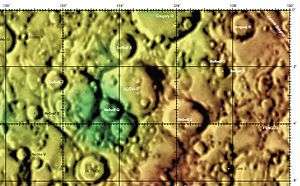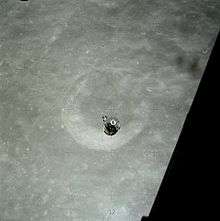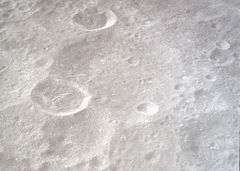Bečvář (crater)
|
Oblique view of Bečvář from Apollo 17, facing north. Bečvář X is at top near center, Bečvář Q is below left of center, and Bečvář J is partially visible in lower right. | |
| Coordinates | 2°54′S 124°30′E / 2.9°S 124.5°ECoordinates: 2°54′S 124°30′E / 2.9°S 124.5°E |
|---|---|
| Diameter | 67 km |
| Depth | Unknown |
| Colongitude | 236° at sunrise |
| Eponym | Antonín Bečvář |

Bečvář (Czech pronunciation: [ˈbɛtʃvaːr̝̊]) is a lunar crater that is located near the equator on the far side of the Moon from the Earth. It lies to the northeast of the crater Necho, within that feature's ray system. To the north-northeast is the crater Gregory.
This is a worn, eroded crater system with a few tiny craterlets lying across the floor and rim. A double-crater formation occupies the southwestern rim, with Bečvář Q forming the northwestern member of this pair. The crater Bečvář X is attached to the northern rim.
Bečvář lies at the center of an unnamed, highly subdued, 200 km diameter crater which was originally discovered during the Apollo 16 mission and reported by Farouk El-Baz. The name Necho was proposed for the crater, but the name was eventually adopted for the small, bright-rayed crater along the south margin of the unnamed crater.[1]
Satellite craters

By convention these features are identified on lunar maps by placing the letter on the side of the crater midpoint that is closest to Bečvář.
| Bečvář | Latitude | Longitude | Diameter |
|---|---|---|---|
| D | 1.5° S | 126.5° E | 15 km |
| E | 2.0° S | 127.8° E | 15 km |
| J | 3.6° S | 126.6° E | 45 km |
| Q | 2.9° S | 124.0° E | 28 km |
| S | 3.0° S | 121.1° E | 14 km |
| T | 1.8° S | 121.9° E | 27 km |
| X | 0.6° S | 124.2° E | 26 km |
References
- ↑ Apollo 16 Preliminary Science Report (NASA SP-315), 1972, Chapter 29, Part H: Discovery of Two Lunar Features
- Andersson, L. E.; Whitaker, E. A. (1982). NASA Catalogue of Lunar Nomenclature. NASA RP-1097.
- Blue, Jennifer (July 25, 2007). "Gazetteer of Planetary Nomenclature". USGS. Retrieved 2007-08-05.
- Bussey, B.; Spudis, P. (2004). The Clementine Atlas of the Moon. New York: Cambridge University Press. ISBN 978-0-521-81528-4.
- Cocks, Elijah E.; Cocks, Josiah C. (1995). Who's Who on the Moon: A Biographical Dictionary of Lunar Nomenclature. Tudor Publishers. ISBN 978-0-936389-27-1.
- McDowell, Jonathan (July 15, 2007). "Lunar Nomenclature". Jonathan's Space Report. Retrieved 2007-10-24.
- Menzel, D. H.; Minnaert, M.; Levin, B.; Dollfus, A.; Bell, B. (1971). "Report on Lunar Nomenclature by the Working Group of Commission 17 of the IAU". Space Science Reviews. 12 (2): 136–186. Bibcode:1971SSRv...12..136M. doi:10.1007/BF00171763.
- Moore, Patrick (2001). On the Moon. Sterling Publishing Co. ISBN 978-0-304-35469-6.
- Price, Fred W. (1988). The Moon Observer's Handbook. Cambridge University Press. ISBN 978-0-521-33500-3.
- Rükl, Antonín (1990). Atlas of the Moon. Kalmbach Books. ISBN 978-0-913135-17-4.
- Webb, Rev. T. W. (1962). Celestial Objects for Common Telescopes (6th revised ed.). Dover. ISBN 978-0-486-20917-3.
- Whitaker, Ewen A. (1999). Mapping and Naming the Moon. Cambridge University Press. ISBN 978-0-521-62248-6.
- Wlasuk, Peter T. (2000). Observing the Moon. Springer. ISBN 978-1-85233-193-1.
